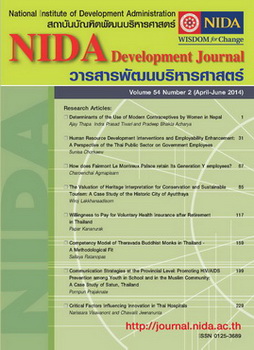Human Resource Development Interventions and Employability Enhancement: A Perspective of the Thai Public Sector on Government Employees
DOI:
https://doi.org/10.14456/ndj.2014.22Keywords:
Human Resource Development, Employability, Short-Term Employment, Public SectorAbstract
The objectives of this research were to identify the expected and perceived employability of Thai government employees and to analyze the effect of human resource development interventions on employability. The primary data were mainly based on the cross-sectional data collected from a unit consisting of 127 departments and 60 organizations at the departmental level. The representation of each organization was a person whose position was director of a human resource management department. The findings showed that the highest scores on expected employability were responsibility (personal qualification), teamwork, and interpersonal skills (people-related skills). The findings also indicated the lowest score was expected and perceived employability, especially regarding fundamental and conceptual thinking skills. The findings further showed that among the HRD factors, training and organization development (OD) had positive and significant effects on employability. When including the control variables (total number of workforce, total number of contract employees, education and experience of the contract employees), it was seen that the effect of the OD was persistent while the effect of the training was greatly reduced. Surprisingly, the study found that career development (CD) had no effect on employability at all. Since there has been no research supporting the direct association between OD and employability, the effect of OD on employability theoretically contributes to the fields of human resource development and employability.Downloads
Published
21-04-2014
How to Cite
Chorkaew, S. (2014). Human Resource Development Interventions and Employability Enhancement: A Perspective of the Thai Public Sector on Government Employees. NIDA Development Journal, 54(2), 31–66. https://doi.org/10.14456/ndj.2014.22





